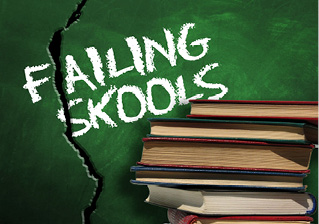Homeschooling, education and America’s academic decline
By Laila Muhammad | Last updated: Jun 12, 2013 - 12:24:48 PMWhat's your opinion on this article?

|
Inner city schools are closing every day, charter and alternatives schools are sprouting up all over the city, yet dropouts continue, tests scores often remain stagnant, and teacher to student ratios in average inner city schools are horrible—well beyond the recommended 15:1 student-teacher ratio recommended for instructors to actually teach.
As noted by Huffington Post, the USA left the 2012 Olympic Games in London with 104 medals, but ranks fourth to last in academics worldwide. A Harvard University Program on Education Policy and Governance found that U.S. students aren’t progressing fast enough to catch up to foreign peers. Students in Latvia, Chile, and Brazil are making gains in academics three times faster than American students, according to the Harvard research. American students ranked 25th in math, 17th in science, and 14th in reading out of 28 countries. The study also shed light on how low the U.S. is sinking. Seventy percent of eighth graders can’t read proficiently, and most will never catch up. Over one million students drop out of high school every year—many falling into joblessness.

|
Homeschooling, also called home education or home-based learning, is the single fastest growing educational trend in the U.S. This may seem like a new phenomenon, especially when it comes to the Western world’s view of education. But such teaching and learning has been going on for centuries in other parts of the world, from remote villages in Peru, to huge dynasties in China.
With teacher strikes, dwindling resources, overcrowded classrooms and educational inequality, homeschooling is a great alternative. More and more parents are opting out of formal public education and opting into a more hands-on approach to their children’s learning. Of parents who home school, about 73 percent cited dissatisfaction with the public schools as their reason for opting out. But the most common reason given was a desire to provide a religious and moral atmosphere and instruction for their children. According to the National Center for Educational Statistics, as of this year, about 2.04 million students are homeschooled. These numbers have been growing consistently; in 2007 about 1.5 million children were homeschooled, an increase from 850,000 in 1999 and 1.1 million in 2003. That’s an increase of about 15 percent per year.
While many would agree with inadequate instruction and other issues in public schools, there is a myth that homeschooling produces social misfits. Dr. Raymond Moore, in his book Better Late Than Early, writes, “The idea that children need to be around many other youngsters in order to be ‘socialized’ is perhaps the most dangerous and extravagant myth in education and child rearing today.” In one study measuring communication, daily living skills, socialization, and maturity, homeschoolers outscored public children on every level. Statistics show that homeschooled children in grades K-12 scored on average in the 87th percentile, meaning they scored higher than the vast majority of their peers. When it comes to test taking, these children consistently outperform public school children. They graduate from college at a higher rate than their peers. They generally have higher grade point averages.
There are a multitude of resources to help on the journey toward schooling children from parent groups to a multitude of websites. The most popular, backed by a grant from Bill Gates, is produced by Salman Khan, a 35 year old hedge fund manager turned YouTube professor and creator of Khan Academy, an online repository of some 3,250 digital lectures related to education and home schooling.
Does not almost every parent want to produce, happy, healthy, educated children that will be great contributors to this world? Take a look into homeschooling, we need a normal.
(Laila Muhammad is a Final Call production assistant, writer and videographer.)
INSIDE STORIES AND REVIEWS
-
-
About Harriett ... and the Negro Hollywood Road Show
By Rabiah Muhammad, Guest Columnist » Full Story -
Skepticism greets Jay-Z, NFL talk of inspiring change
By Bryan 18X Crawford and Richard B. Muhammad The Final Call Newspaper @TheFinalCall » Full Story -
The painful problem of Black girls and suicide
By Charlene Muhammad -National Correspondent- » Full Story -
Exploitation of Innocence - Report: Perceptions, policies hurting Black girls
By Charlene Muhammad -National Correspondent- » Full Story -
Big Ballin: Big ideas fuel a father’s Big Baller Brand and brash business sense
By Bryan Crawford -Contributing Writer- » Full Story






 Click Here Stay Connected!
Click Here Stay Connected!








